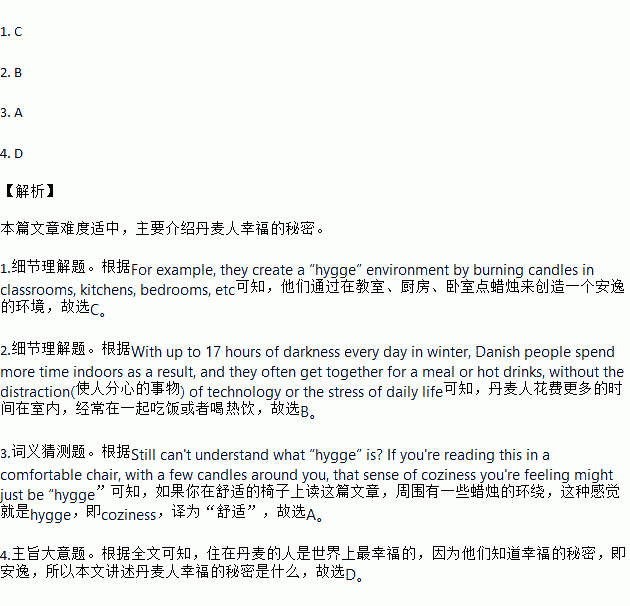题目内容
According to the World Happiness Report, people who live in Denmark (丹麦) are the happiest in the world. Why? Because they know the secret to happiness—“hygge”. But what is “hygge”?
The Danish (丹麦的) word “hygge” (pronounced “hoo?ga”) is often translated(翻译) in English as “coziness”. But coziness paints only part of the picture. It's also about spending peaceful time in a quiet environment with no calendar. It's about spending time alone or spending time with family.
Danish people are very good at “hygge”. For example, they create a “hygge” environment by burning candles in classrooms, kitchens, bedrooms, etc. According to some reports, Danish people burn more candles every year than people from any other European country.
However, “hygge” isn't just about creating a nice and warm environment; it is best enjoyed with family members and friends. With up to 17 hours of darkness every day in winter, Danish people spend more time indoors as a result, and they often get together for a meal or hot drinks, without the distraction(使人分心的事物) of technology or the stress of daily life.
Still can't understand what “hygge” is? If you're reading this in a comfortable chair, with a few candles around you, that sense of coziness you're feeling might just be “hygge”.
1.How do Danish people create a “hygge” environment?
A. By painting their houses.
B. By cleaning up bedrooms.
C. By burning candles.
D. By shopping alone.
2.With up to 17 hours of darkness every day in winter, Danish people________.
①play computer games till midnight
②spend more time indoors as a result
③stay up late to work in their own rooms
④often get together for a meal or hot drinks
A. ①② B. ②④
C. ①③ D. ③④
3.In the last paragraph, the word “coziness” means “________” in Chinese.
A. 舒适 B. 友善
C. 奢侈 D. 密切
4.The article mainly tells us________.
A. when Danish people like to stay at home
B. why Danish people burn so many candles
C. how Danish people spend their winter
D. what the Danish secret to happiness is
 阅读快车系列答案
阅读快车系列答案Survey:What were you scared of when you were a kid?
I was scared of spiders but I didn't let my friends know because all of them liked catching these spiders.I was terrified but I just acted cool. -Buding,still afraid of spiders |
I was scared of the dark because I didn't know if there was something scary inside the room.As a result,I always liked sleeping with my back facing the wall because it made me a little comfortable. -Gerard,not so afraid of the dark anymore,but still sleeps with his back facing the wall |
Strange as it probably sounds,I was scared of shadows (影子).Not the shadows themselves,but what they formed (形成).Because I was near-sighted (近视的),the shadows I saw formed into the scariest things I saw in my mind. -Jean,no longer afraid of shadows |
I was afraid of the old woman who lived alone right in front of us.Very large trees covered the front part of her small house.The few times I saw the old woman,it scared me because she looked like a witch (女巫).Once I was playing volleyball with my friends and the ball flew into her house.We all ran home quickly and decided that it was okay to lose the ball instead of seeing her come out of the house. -Mac,who has already moved to a different house |
1.Buding used to be afraid of ______ .
A. the dark B. spiders C. shadows D. an old woman
2.Gerard sleeps ______ .
A. with the light on B. with his parents
C. with the window open D. with his back facing the wall
3.There is something wrong with Jean's ______ .
A. legs B. back C. eyes D. feet
4.The old woman lived in a small house ______ .
A. by herself B. with her daughter
C. with her husband D. with her grandmother
5.After the volleyball flew into the woman's house,Mac and his friends ______ .
A. ran home quickly B. asked her for it
C. broke into her house D. waited for her to come out.

